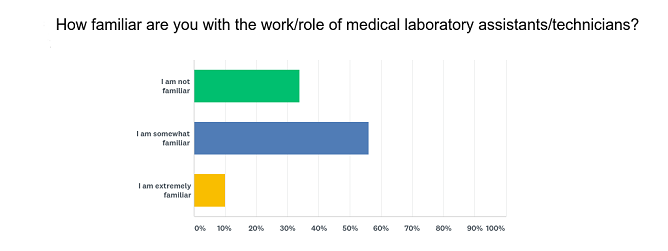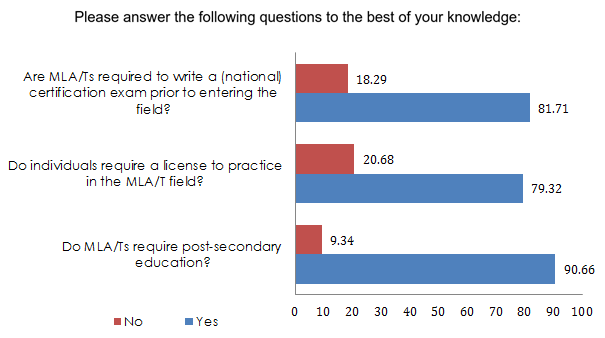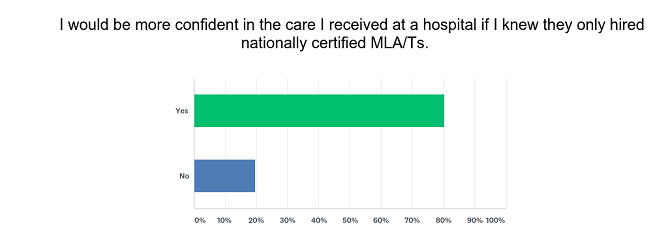Public Awareness Survey
The purpose of the CSMLS Public Awareness Survey is to:
- Determine public awareness of medical laboratory assistants (MLAs)
- Gauge public sentiment about the importance and impact of MLAs
- Measure confidence in the skills and abilities of MLAs
- Benchmark attitudes towards the training and certification of MLAs
A survey was released to 500 members of the general public on March 1, 2018. The distribution was Canada-wide to an audience with a varied age range and household income in order to gain a broad perspective from the “average” Canadian.
The response rate was 510 unique respondents within the given timeframe.
Individuals participated in the survey from across Canada. Ontario (43%), Quebec (16%) and British Columbia (13%) had the highest participation rate, whereas Prince Edward Island (1%), New Brunswick (2%) and Newfoundland and Labrador (3%) had the lowest. There were no participants from the territories.
Graph 1: Total Participation per Province/Territory
The majority of participants were 45-60 years of age (31%), followed closely by those 30-44 (30%). Only (17%) were in the 60+ range and (22%) stated they were 18-29 years of age.
Graph 2: Total Participation per Age Range
The majority of respondents (56%) feel they are “somewhat” familiar with the role/work of medical laboratory assistants, while (34%) were “not familiar” and only (10%) feel they are extremely familiar with the profession.
This is in line with CSMLS expectations as we know the public understands the overall purpose of the laboratory; the majority are not familiar with the nuances between various positions within the lab.
Graph 3: Familiarity of work/role of MLA/Ts

Survey participants were then given a brief description of who medical laboratory assistants/technicians (MLA/T) are and some of the work they do, questions were posed to determine the importance and impact that these professionals have.
Nearly all participants believe that the role of MLAs is important in Canadian healthcare (98.8%). Even without a complete understanding of the duties of these individuals within the lab, the public believes that their role is important.
Graph 4: Belief that the role of MLA/Ts is important in Canadian healthcare
Almost all respondents believe that MLAs impact patient care in Canada (96.4%). Again, even being only “somewhat familiar” with medical laboratory assistants and their role in healthcare, respondents believe that what they do has an impact on the care a patient receives.
Graph 5: Belief that MLA/Ts impact patient care in Canada.
A subset of questions was directed to gather a better understanding of the perception of current education and certification requirements for the profession. The majority of respondents believe that MLA/Ts require post-secondary education (91%). For regulation/licensure, the bulk (79%) believe that anyone practising as an MLA/T field must have a license and a vast number (81%) believe that MLA/Ts are required to write a national exam prior to entering the field.
Graph 6: Understanding of current requirements to enter the medical laboratory assistant/technician field

The next group of questions was targeted at gaining public perception of confidence in the profession given that:
- “Medical laboratory assistant/technician” is not currently a regulated profession in any province in Canada
- Training varies from college level programs to on the job training
- A license is not required
- There is no mandatory exam to be written before entering the field (though there are voluntary certification exams available)
With this new information, more than half of respondents (56.4%) felt somewhat confident that MLA/Ts had the skills needed to perform their duties. Nearly a quarter (24%) felt extremely confident.
Graph 7: Confidence that MLA/Ts have the skills needed to perform their duties
Similarly, individuals were asked about their confidence that MLA/Ts endeavour to give patients the best health care possible. (59%) of people were somewhat confident in that analysis, (27%) were extremely confident and only (13%) were not confident.
Graph 8: Confidence that MLA/Ts attempt to deliver the best healthcare possible
The next subset of questions provided potential scenarios to participants to gauge their confidence in the skills and abilities of medical laboratory assistants/technicians given these new circumstances. The first question asked about public confidence if MLA/Ts were to write a national certification exam. The majority of respondents (85%) said yes, they would be more confident if this was a requirement.
Graph 9: Confidence in MLA/Ts if they passed a national exam
To delve into that a bit deeper, the next question focused on national versus provincial certification as both are an option for medical laboratory assistants/technicians. An overwhelming number of respondents (79%) indicated that they would be more confident in the care received if the MLA/T passed a national exam.
Graph 10: Confidence in MLA/Ts if they passed a national vs. provincial exam
The next two questions were targeted at obtaining public perception of workplaces that hire medical laboratory assistants/technicians and the confidence in results and care received from these places if only nationally certified MLA/Ts were hired.
Not surprisingly, the majority of participants would be more confident in the care received in a hospital setting or a private community laboratory (80% and 79% respectively) if they only hired nationally certified MLA/Ts.
Graph 11: Confidence in care received in a hospital that hired only nationally certified MLA/Ts

Graph 12: Confidence in care received in a private community lab that hired only nationally certified MLA/Ts
Overall, participant comments exposed that there is an opportunity to increase the public confidence in MLA/Ts, providing they write and pass a national certification exam. There is also a strong indication that although provincial certification is offered, participants would find MLA/Ts more reliable if they passed a national exam.
Secondary to this, responses also uncovered a lack of understanding of the current situation of working medical laboratory assistants/technicians in Canada. Once participants understood the existing set of circumstances regarding education and certification of MLA/Ts, their perspective shifted.